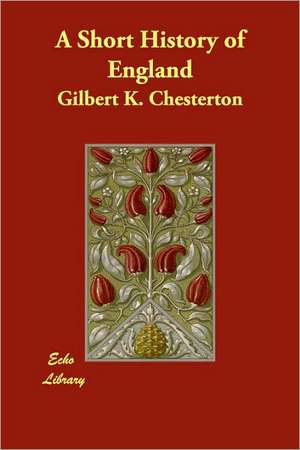A Short History of England
Autor G. K. Chestertonen Limba Engleză Paperback – 29 feb 2008
| Toate formatele și edițiile | Preț | Express |
|---|---|---|
| Paperback (16) | 37.56 lei 22-36 zile | |
| e-artnow – 14 dec 2020 | 37.56 lei 22-36 zile | |
| CreateSpace Independent Publishing Platform – | 54.61 lei 22-36 zile | |
| CREATESPACE – | 56.88 lei 22-36 zile | |
| CREATESPACE – | 71.43 lei 22-36 zile | |
| ALPHA EDITION – 14 dec 2023 | 101.63 lei 22-36 zile | |
| CREATESPACE – | 103.36 lei 22-36 zile | |
| Alpha Editions – 31 oct 2018 | 53.83 lei 43-57 zile | |
| – | 65.63 lei 43-57 zile | |
| Aziloth Books – 12 iun 2012 | 75.39 lei 43-57 zile | |
| Echo Library – 29 feb 2008 | 76.08 lei 38-44 zile | |
| CREATESPACE – | 80.86 lei 43-57 zile | |
| 1st World Publishing – 24 iul 2013 | 81.31 lei 43-57 zile | |
| Aegypan Press – 29 feb 2008 | 82.77 lei 43-57 zile | |
| Indoeuropeanpublishing.com – 23 iul 2018 | 101.17 lei 43-57 zile | |
| LIGHTNING SOURCE INC – 26 mai 2018 | 160.31 lei 17-23 zile | |
| Spencer Press – 14 mar 2007 | 218.28 lei 38-44 zile | |
| Hardback (1) | 175.47 lei 43-57 zile | |
| 1st World Publishing – 24 iul 2013 | 175.47 lei 43-57 zile |
Preț: 76.08 lei
Nou
Puncte Express: 114
Preț estimativ în valută:
14.56€ • 15.24$ • 12.12£
14.56€ • 15.24$ • 12.12£
Carte tipărită la comandă
Livrare economică 26 martie-01 aprilie
Preluare comenzi: 021 569.72.76
Specificații
ISBN-13: 9781406890617
ISBN-10: 1406890618
Pagini: 112
Dimensiuni: 152 x 229 x 7 mm
Greutate: 0.18 kg
Editura: Echo Library
Locul publicării:United Kingdom
ISBN-10: 1406890618
Pagini: 112
Dimensiuni: 152 x 229 x 7 mm
Greutate: 0.18 kg
Editura: Echo Library
Locul publicării:United Kingdom
Notă biografică
Gilbert Keith Chesterton (1874 - 1936), better known as G. K. Chesterton, was an English writer, poet, philosopher, dramatist, journalist, orator, lay theologian, biographer and literary and art critic. Chesterton is often referred to as the "prince of paradox". Time magazine has observed of his writing style: "Whenever possible Chesterton made his points with popular sayings, proverbs, allegories-first carefully turning them inside out." Chesterton is well known for his fictional priest-detective Father Brown and for his reasoned apologetics. Even some of those who disagree with him have recognized the wide appeal of such works as Orthodoxy and The Everlasting Man. Chesterton, as a political thinker, cast aspersions on both Progressivism and Conservatism, saying, "The whole modern world has divided itself into Conservatives and Progressives. The business of Progressives is to go on making mistakes. The business of the Conservatives is to prevent the mistakes from being corrected." Chesterton routinely referred to himself as an "orthodox" Christian and came to identify this position more and more with Catholicism, eventually converting to Catholicism from High Church Anglicanism. George Bernard Shaw, Chesterton's "friendly enemy" according to Time, said of him, "He was a man of colossal genius."
